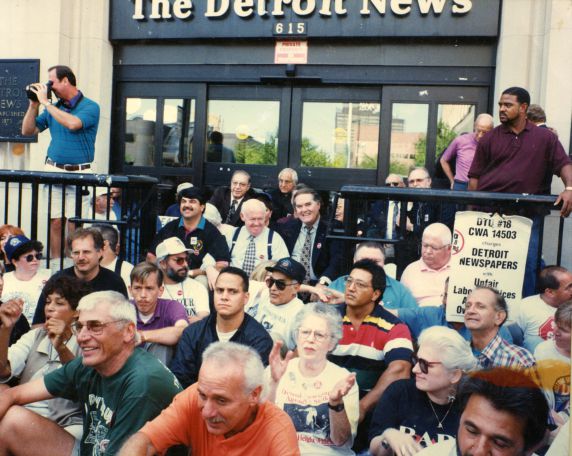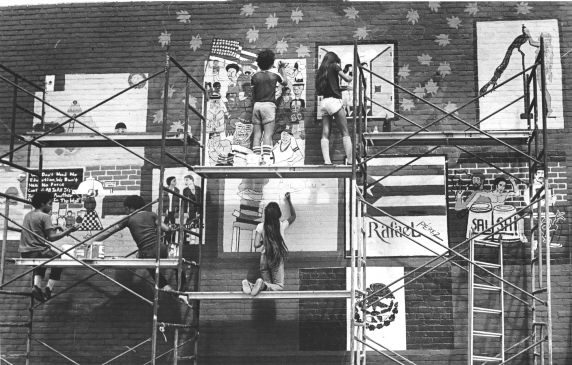Guest Post: Ciera Casteel on the Wayne State University Oral History Course Oral Histories
- Cass Corridor (Detroit, Mich.)
- Community Development
- Detroit (Mich.)
- Discrimination in housing--Michigan
- Gay community--History--20th Century
- Gay rights--Michigan
- Newspaper employees
- Newspaper strike, Detroit, Michigan, 1995-2000
- Oral history
- Poletown (Detroit, Mich.)
- Rhythm and blues music
- Segregation
- Social Justice
- Student Blogger Series
- Transgender people
- University Archives
- Urban development
- Urban renewal
- Wayne State University
- Women in the labor movement
Please note: The oral history course collections mentioned in this post have been consolidated into one collection: Wayne State University Oral History Methodology Course Oral Histories. Please refer to the finding aid here: https://archives.wayne.edu/repositories/2/resources/3381.
Over the course of the last few months I had the opportunity to work at the Reuther Library processing oral history collections. This was an incredible experience through which I was able to create tools to increase researchers' access to four relatively new collections: the Wayne State University Oral History Course Oral Histories. These four collections are a treasure for researchers studying a number of topics. The interviews in these collections were conducted between 2013 and 2016 by Wayne State University graduate students with the goal of adding stories of individuals traditionally marginalized or ignored by the historical record; enriching the existing understanding of historical narratives of Detroit and its people.
Ciera Casteel was a Winter 2018 practicum student. This post is her summary of the collections she processed throughout her experience.
The 2013 interviews include the testimony of nine individuals involved in the 1995-1997 Detroit Newspaper Strike. Workers at both the Detroit News and the Detroit Free Press went on strike during this time, and while the strike ended in 1997, it was not resolved until a 2000 court decision that determined the newspaper companies had not engaged in unfair labor practices. Perspectives on the strikes range from men and women who worked for the newspapers, a Sterling Heights City Council member who supported the strikes and her striking husband, as well as a Catholic Bishop who protested the treatment of the newspaper workers. For researchers looking for more information on the Strikes, the Reuther Library maintains multiple related collections including the Detroit Newspaper Strike Collection, the Action Coalition of Strikers Records, the Ellen Creager Papers, the Nancy E. Dunn Papers, the Todd Winge Papers, and the Thomas Bernick Papers.
Collections from 2014 through 2016 range in subject and provide important contributions to an understanding of history, life, art, and activism in the city of Detroit.
Researchers interested in the history of Southwest Detroit, may look to the 2014 oral histories collection in which women community builders document their work to maintain the Latinx culture of the neighborhood and care for its residents. A related collection for researchers looking for more information on this historic neighborhood, is the Detroit Latino Records.
To better understand Michigan Environmental Justice Activism, the 2014 oral histories provides narratives from activists who have been part of initiatives across the state, including the protests and continued agitation against the recently closed Detroit Incinerator. Related collections are the Thomas W. Stephens Papers, Karen Kendrick-Hands Papers, and the Urban Environment Conference (UEC) Records.
The 2014 collection also contains oral documentation of Detroit’s economic development and policing histories. In the midst of the current growth of reinvestment back into the city of Detroit, these discussions are both timely and necessary. Researchers looking for more information on the history of Detroit’s economic development should review to the Detroit Economic Development Corporation Records.
One of the things Detroit is best known for, its influence in music development, is a topic covered heavily in the WSU 2015 and 2016 oral history collections. These collections focus on Detroit Music History, including but not limited to Motown, with notable interviews such as Melvin Davis, Dennis Coffey, and Pat Lewis.
Cass Corridor, another Detroit neighborhood witnessing rapid change in 2019, is also featured in the interviews conducted in the 2015 and 2016 oral histories. These histories offer valuable insight into both the past and the future of the Cass Corridor from those who have lived in and fought for it. Researchers interested in Cass Corridor should also consult the North Cass Community Union Records.
Charting LGBTQ activism and history in Detroit, interviewers in 2016 recorded the experiences of LGBTQ identified individuals to highlight their contributions to Detroit’s history and the communities in which they live. After checking out the oral histories, researchers can get more information from the LGBT Detroit Records.
Despite their varied subjects, what all of the WSU Oral History Course Oral History collections have in common is their ability to adding seldom explored stories and voices to the historical narrative of the great city of Detroit. Stop into the Reuther Library to take advantage of the offerings of these new collections!



 Reddit
Reddit Facebook
Facebook LinkedIn
LinkedIn